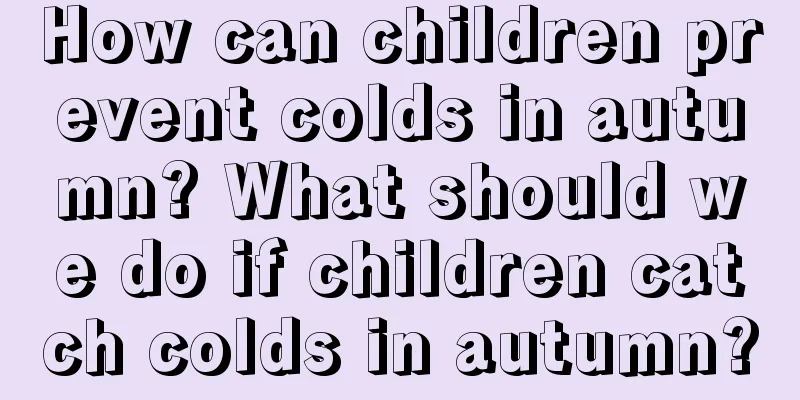How can children prevent colds in autumn? What should we do if children catch colds in autumn?

|
The climate in autumn is dry and the temperature difference is large. It is a season with many colds. How can parents prevent their babies from catching colds? What safety knowledge do you need to know in autumn? Let's learn from the editor~ How to prevent colds in children in autumnAutumn colds have always been a heavy burden on parents. Every autumn, the climate is dry, the weather changes quickly, and the temperature difference between day and night is large. Any of these factors may cause the delicate baby to catch a cold. The pain of the baby is in the parents' hearts. If the baby does not recover for a long time, the parents' hearts are like being burned by fire. They just want to suffer for the baby, but they are powerless. Prevention is better than cure for babies' autumn colds. No matter how good the treatment method is, it is not as good as not getting sick. The editor has compiled some effective ways for parents to prevent babies from catching colds, which will definitely help everyone. 1. The most direct and effective way to prevent colds is to wash your hands frequently.Relevant research shows that there are more than 200 viruses that cause colds, 50% of which are rhinoviruses, which are also the most contagious viruses in autumn. They can survive on towels for 1 hour and on human hands for 70 hours. Once a baby touches an object contaminated with the virus and then unconsciously rubs his eyes or touches his nose with his hands, he will be infected with a cold, with an incubation period of 1 to 4 days. Therefore, you must wash your baby's hands frequently. 2. Cover up in spring and keep cold in autumn. How much clothes you wear is the key to preventing coldsWhen the weather turns from warm to cold, don't rush to add more clothes for your child. The weather is getting colder day by day, and it's hard to take off the clothes after adding more. You can only add more and more clothes. When dressing a baby, you can follow the principle of wearing one more layer than an adult, and pay attention to putting on and taking off clothes in time when exercising. 3. The first lesson for babies to enhance their resistance: cold-resistance trainingMany parents, fearing that their babies will get cold, will not let them out of the house when the weather gets cold. If the baby's respiratory tract is not exposed to the stimulation of the outside air for a long time and cannot be trained to withstand the cold, when the spring comes or after contact with a cold patient, the baby's resistance to pathogens is poor and it is easy to get sick. The baby's room should also be ventilated frequently to ensure fresh air and avoid the growth of bacteria and viruses. 4. Improve immunity and pay attention to your baby’s dietParents should feed their babies more foods rich in vitamin C, such as tomatoes and kiwis, which can help improve their immunity. You can give your baby some chicken soup, which is rich in protein and can enhance the body's resistance. Adding some garlic will have a better effect. In addition, if the baby is willing, you can give him some green onions or boiled water with green onions, which is also very effective. 5. If you don’t want your baby to kick the quilt, the trick is to wear less clothes on your baby.Babies kicking off the quilt is a headache for parents. In autumn and winter, babies are very likely to catch a cold if they kick off the quilt. But why do babies kick off the quilt? Is it because they are not good at sleeping or are naughty? No, it is because the baby is too hot! In order to prevent the baby from kicking off the quilt and getting cold, many parents put thick knitted underwear or pajamas on the baby and cover the baby with thicker covers. In the second half of the night, the baby sweats from the heat and kicks off the quilt. At this time, the parents are also asleep and are most likely to catch a cold. It is better to put on light and skin-friendly shorts and vests for the baby. The baby will sleep peacefully and comfortably, and naturally he will not like to kick off the quilt. 6. Washing your face and feet scientifically can also help your baby prevent coldsWashing the face with warm or cold water can increase the baby's ability to adapt to cold stimulation. The benefits of foot soaking are self-evident. Soaking the baby's feet with hot water every night is also effective in preventing the baby from catching a cold. 7. Take a cold air bath appropriatelyAs the temperature difference between morning and evening increases in autumn and winter, many mothers put thick clothes on their babies as soon as they feel a little cold, fearing that their babies will catch a cold. Is this really right? In fact, if mothers put thick clothes on their babies too early, it will only reduce their ability to resist the cold and make them more likely to catch a cold. This is the reason why the saying "cover up in spring and freeze in autumn" is true. In this season, mothers can dress their babies appropriately according to the actual temperature, and increase the time for outdoor activities appropriately, so that babies can move around in cold air appropriately. After cold air bath training, the baby's skin can increase its ability to resist the cold, thus achieving the goal of not catching a cold or catching a cold less often. 8. Eat a balanced dietComprehensive nutrition can improve the baby's disease resistance. While promoting breastfeeding, mothers should ensure that the baby's daily diet is reasonable and balanced, and do not cultivate bad habits such as partiality in the baby, so as to avoid low resistance and frequent colds due to insufficient nutrition. 9. Wear appropriate blankets and clothes when sleepingWhen the baby is sleeping, the mother must not cover the baby with a quilt that is too thick, because the baby will kick the quilt because he feels hot. When the temperature drops at night, the baby without a quilt will easily catch a cold. In addition, when the baby is sleeping, the mother should not put the baby in thick pajamas. Instead, put on small pants and small vests. The baby can sleep more peacefully and is less likely to kick the quilt. In addition, when the baby just wakes up, the mother should not take the baby outdoors immediately. Let the baby move around indoors for a while to prevent the baby from catching a cold due to the inability to adapt to the temperature difference between indoors and outdoors. 10. Try to avoid or avoid going to public placesColds are more common in autumn and winter. In some public places with poor air circulation and noisy people, there will be a lot of pathogenic bacteria and viruses. Try to go to public places less or not, so that your baby can stay away from pathogens and prevent colds. Safety tips for young children in autumnAutumn is a dry season, and it is also a season that is prone to getting angry and catching a cold. Children will catch a cold and get angry if they are not careful. Therefore, parents should be especially careful in this season. Here are some safety tips for young children in autumn. Let's take a look! 1. Teach children to pay attention to fire prevention knowledgeThe climate in autumn is relatively dry, so we can carry out fire prevention education, recognize fire prevention signs, and know fire safety knowledge. Through daily life activities such as "Drink more water for good health" and "Don't play with fire", let children know that drinking more water is good for health and cultivate good drinking habits; know that they can't play with fire casually, recognize fire prevention signs, and know fire safety knowledge. 2. Eat less "heaty" foods in autumnYou should eat less irritating foods, such as garlic, ginger, leeks, peppers, and chili peppers, as they can easily cause internal heat. You should also eat less salty foods, because too much salt can accelerate the loss of water in the body. You should also eat less fried foods that are too high in calories and some hot fruits, such as lychees, longans, and oranges. 3. Prevent children from catching cold in autumnThere are many cold waves in autumn and winter, and the temperature changes greatly. Young children are prone to catching colds, which often lead to many serious illnesses, such as pneumonia, myocarditis, lobar pneumonia, and acute nephritis. Therefore, children should be kept warm in autumn and winter to prevent them from catching cold. 4. The weather is dry in autumn, so pay attention to protecting your child’s skinAutumn and winter are cold and dry seasons, and children's skin loses a lot of water, the sebaceous glands secrete less, and the skin is prone to dryness and itching. Let children eat more vegetables and fruits, drink more boiled water, and wash their hands, feet, and face with hot water frequently, and then apply some skin cream appropriately. 5. Pay attention to the room temperature in autumn when the temperature difference is largeThe ideal temperature for the human body in autumn and winter is 18 degrees Celsius. If it is higher than 23 degrees Celsius, people will feel dizzy and tired. In addition, if the temperature difference between indoor and outdoor is large, it is easy to catch a cold. 6. Take your children to outdoor sports more oftenAutumn is the best season for outdoor sports. Parents should take their children outdoors more often and let them get more sun. Sunbathing can promote the absorption of calcium and also enhance the physical fitness of children. 7. Take your children out to get more sun.The ultraviolet rays in the sun can kill viruses and bacteria on the human body surface, help children absorb calcium and phosphorus, and enhance the body's disease resistance. In addition, the sun can also increase the oxygen content of red blood cells and enhance the temperature regulation of the skin, as well as enhance the activity of the nervous system and the physical fitness of children. 8. Teach your children not to sit on cold surfacesIn autumn and winter, the ground temperature is very low. If a child sits on it, the body heat will be lost a lot, and it is easy to catch a cold. In autumn and winter, don't avoid taking your child outdoors for fear that he will be cold. When the weather is good, you should go out to play more. As long as there is sunshine, take your child to the park to bask in the sun. On the one hand, it promotes calcium absorption, and on the other hand, it allows you to breathe fresh air outdoors. In winter, you can take a walk outdoors around noon when it is sunny and windless, for about 20 to 30 minutes. 9. Wear an extra layer of clothing at nightDue to the large temperature difference in autumn, children should wear one more piece of clothing in the morning and evening than in the daytime. For children who are active and sweat easily, you can put a towel behind them when they are playing or change their clothes in time after playing. At the same time, children should mainly wear light sports shoes and less leather shoes. 10. Keep indoor ventilationAlthough the weather will gradually get colder, you should still open the windows for ventilation at a certain time when you are at home to keep the indoor air circulating. Children's quilts need to be exposed to the sun frequently. Parents can bring their children's quilts home every Friday and use the weekend to wash and dry them. "No. 5 Parenting" (:yuer5h) |
<<: China has the largest number of obese children. How to prevent childhood obesity?
>>: How to hold a newborn baby? Can a newborn baby be held upright?
Recommend
What are the effects of cesarean section anesthesia on pregnant women?
Nowadays, more and more pregnant women choose cae...
What to do if your baby has a stuffy nose for more than one month
The baby has grown up for more than one month and...
Does low menstrual flow really affect pregnancy?
In modern society, work pressure is high. Some wo...
Does drinking affect ovulation? Does drinking affect pregnancy test results?
Many people will quit smoking and drinking when p...
How long does it take for lochia to be discharged after a caesarean section? How long does it take for lochia to be discharged after a caesarean section to be considered normal?
Generally, after giving birth, pregnant women wil...
How old is the baby suitable for wearing underwear? What are the benefits of wearing underwear for babies?
In real life, many people think that babies are s...
How to dress your baby? The order of dressing your baby in winter
Now that the weather is getting colder, there are...
Why do babies not sleep at night? How to care for babies?
New parents deeply understand how difficult it is...
What are the common diseases that babies get in summer? What diseases are babies prone to in summer?
What are the common diseases of babies in summer?...
How to praise children correctly, what are the principles and techniques
Praise is like a stimulant for children, which ca...
How should parents deal with the problem of children's sex education enlightenment?
When children grow up to a certain age, they will...
The correct way to mix feeding How to feed your baby properly
There are relatively few families that exclusivel...
What foods are good to eat during pregnancy preparation? What foods can promote ovulation during pregnancy preparation?
Preparing for pregnancy is a process that every c...
Can cleft lip be cured? Cleft lip repair surgery
If your baby has a cleft lip, you should get trea...
What radical is good for baby names in the Year of the Rat in 2020? What character is good for baby names in the Year of the Rat?
The year 2020 is coming soon. For parents who are...









